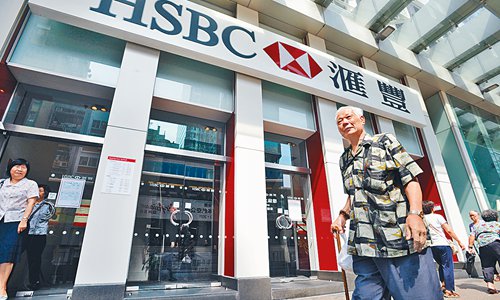Misjudgment of China-UK ties suggests grim prospects for British economy
Source: Global Times Published: 2020/7/29 17:48:42

People pass by a HSBC bank in Hong Kong in February. Photo: IC
With more evidence emerging about whether UK-based bank HSBC has played a role in the arrest of Huawei CFO Meng Wanzhou, criticism on the bank is growing in China - the bank's largest market.
Headquartered in London and operating in over 50 countries and regions, the multinational bank, makes the major part of its profits in the Hong Kong Special Administrative Region and Chinese mainland, while running a deficit in Europe. Ever since China said it will establish a list of unreliable entities, there have been voices calling for inclusion of HSBC in the list.
The latest evidence will further damage Chinese enterprises' confidence in the bank. The lender has reportedly closed six branches in the Chinese mainland this year, alongside its plan to lay off 35,000 employees amid the COVID-19 pandemic.
Not only is the British lender facing dim prospects in China, the UK seems to have been misjudging its economic ties with China, which will lead its economy to a grim future during the post-pandemic and post-Brexit era.
According to data from the UK's Department for International Trade, China has been the largest trading partner for the UK in the Asia-Pacific region. Also, the UK has maintained close commercial connections with Hong Kong. The city was the UK's second-largest market for goods in the Asia-Pacific region in the year ending May 2020, just behind the Chinese mainland.
Also, as one of the most important investment destinations for the UK in the Asia-Pacific region, Hong Kong has been a gateway for British firms to explore the Greater China market. So far, there are over 300,000 British citizens living and working in Hong Kong, as well as more than 300 UK firms operating in the city.
Moreover, Hong Kong, with its sound legal and financial infrastructure, plays an important role in the British financial ecosystem, which contributes much to the UK's economy.
However, following the US, the UK has been seeking confrontation with China recently, including issues related to Huawei and the national security law for the Hong Kong Special Administrative Region. Besides political reasons to clamp down on China, UK politicians' misjudgment of China-UK economic ties was lurking behind the ill-intended moves as well. Somehow, the British politicians thought that the UK economy hasn't benefitted much from investment in China, that their economy was strong enough to decouple from China, and that intensified bilateral diplomatic tensions would not affect UK exports to the Chinese market.
The cruel reality for the British economy is that it may not be able to avoid a serious contraction. The country has reported over 302,000 confirmed COVID-19 cases as of Wednesday, the largest number in Europe. The pandemic could even hit the UK economy harder than the global financial crisis and the European debt crisis. Against the backdrop of the UK's weak recovery after the European debt crisis, as well as its long-term problems including low labor productivity growth, high public debt and limited monetary policies, the recovery path for the UK will be particularly bumpy.
Under such circumstances, blindly siding with the "America first" Trump administration to antagonize China is anything but a wise choice, which will weigh heavily on its economic growth amid the deadly pandemic and the post-Brexit era.
The article was compiled based on an interview with Li Gang, an associate professor at the Institute of European Studies under the Chinese Academy of Social Sciences.
bizopinion@globaltimes.com.cn